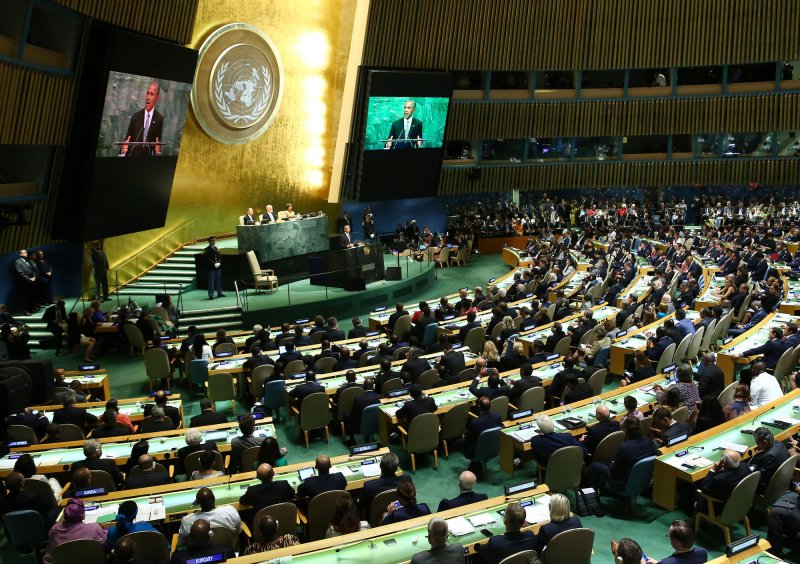U.S. President Barack Obama addresses the 71st session of the General Debate of the United Nations General Assembly in New York City on Tuesday. Will world leaders gathered there do something substantial for Syria? Photo by Monika Graff/UPI |
License Photo
Presidents, prime ministers and foreign secretaries gathered in New York this week for the opening of the 71st annual U.N. General Assembly. As has become custom, they will take turns at the podium calling for an end to the bloodshed in Syria, a conflict that has claimed hundreds of thousands of lives and has led to the largest displacement of people since World War II.
This year's meeting will immediately follow a new cessation of hostilities in Syria, an agreement that has tamped down the violence but is hardly a total cease-fire. Under the mostly undisclosed terms, the Syrian regime and its Russian allies can continue pounding targets they claim are affiliated with the so-called Islamic State or the former al-Qaida affiliate Jabhat Fatah al-Sham. But with past experience as a guide, it's clear that we cannot trust the Syrian or Russian governments to stop targeting civilians and health facilities.
Syrian and Russian forces have claimed that they are striking legitimate targets before, but, as we at Physicians for Human Rights have documented, they have intentionally pummeled civilians and essential infrastructure, raining barrel bombs down on hospitals and dropping indiscriminate weapons over residential neighborhoods. They have repeatedly shown a willingness to shred the norms of international law as they succeed in making attacks on hospitals and civilians the new normal in warfare.
What's more, despite the cessation deal's requirement to allow humanitarian aid deliveries, the Syrian government continues to stonewall. Earlier this month, it approved convoys to areas under siege, and promised the facilitation letters required to carry out aid deliveries, but those letters never came. U.N. warehouses in Damascus remain full of food and medicine that Syria's civilians desperately need. U.N. trucks filled with supplies also idle on the Turkish-Syrian border.
U.N. humanitarian officials insist they are doing all they can to deliver supplies, but they have failed to reach hundreds of thousands of civilians in besieged areas. Earlier this year, PHR documented dozens of deaths from malnutrition in the Syrian town of Madaya, where residents continue to suffer. Even if the tenuous cease-fire holds, countless Syrians still face the very real prospect of dying a slow death from starvation and illness rather than a quick death from a barrel bomb.
So what will the world's presidents, prime ministers and foreign secretaries accomplish this year? Will leaders again offer platitudes and take no action? Will they return home thinking they've accomplished something, when really they've accomplished nothing but more rhetoric?
Or will things be different?
This year, there are opportunities to act. First, at the U.N.- and U.S.-sponsored refugee summits in New York at the beginning of the week, wealthier countries in particular have a chance to make substantive commitments to accepting refugees, to treating those refugees as fellow humans instead of treating them as criminals and to ensuring that refugees have opportunities for work, education and healthcare.
Later in the week, New Zealand's prime minister will host a high-level Security Council meeting aimed at getting peace negotiations back on track. While much of the peacemaking is now in the hands of Russia and the United States, the Security Council has an opportunity this week to move beyond the stalemate we've seen for the past five years and live up to its mandate to maintain international peace and security, with respect for human rights at the core.
Since the conflict in Syria began, the Security Council has been at an impasse. Russia and China have repeatedly vetoed broader attempts at peace and accountability in Syria. Those vetoes have weakened the council and sapped it of much-needed credibility. And because of that impasse – which has allowed Syrian President Bashar al-Assad to continue waging warfare against his population year after year – Syrians have paid an unthinkable price.
This week, member states should use the spotlight of the General Assembly to press for peace and accountability in Syria. The cessation of hostilities, while shaky, shows that diplomacy can have an effect on the ground. If efforts like these can halt the violence, get aid where it's needed, and stop the total assault on Syria's health infrastructure, the Security Council should use this moment to restart diplomacy and regain its relevance.
After Auschwitz, after Cambodia, Rwanda and Yugoslavia, the world pledged never again – again and again. We can either look back on this moment as a time when our leaders failed or we can look back on this moment as a time when our leaders stepped up to put an end to the greatest humanitarian crisis and the greatest shame of the 21st century.
So to world leaders gathering in New York this week: Now's your chance. Commit to caring for those who have fled for their lives to seek haven in your countries. Commit to providing life-saving aid. Commit to holding the war criminals who attack civilians accountable. And commit to ending the Syrian conflict once and for all.
![]()
Donna McKay is the Executive Director of Physicians for Human Rights. This article originally appeared on Syria Deeply, and you can find the original here. For important news about the war in Syria, you can sign up to the Syria Deeply email list.















